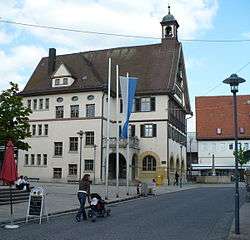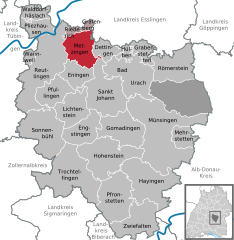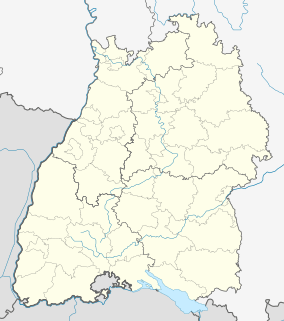Metzingen
Metzingen is a Swabian[2] city with about 22,000 inhabitants, in Reutlingen county, Baden-Württemberg, Germany, 30 km (19 mi) south of Stuttgart.
Metzingen | |
|---|---|
 Town hall of Metzingen | |
 Coat of arms | |
Location of Metzingen within Reutlingen district   | |
 Metzingen  Metzingen | |
| Coordinates: 48°32′12″N 09°17′09″E | |
| Country | Germany |
| State | Baden-Württemberg |
| Admin. region | Tübingen |
| District | Reutlingen |
| Government | |
| • Mayor | Ulrich Fiedler (Ind.) |
| Area | |
| • Total | 34.61 km2 (13.36 sq mi) |
| Elevation | 350 m (1,150 ft) |
| Population (2018-12-31)[1] | |
| • Total | 22,046 |
| • Density | 640/km2 (1,600/sq mi) |
| Time zone | CET/CEST (UTC+1/+2) |
| Postal codes | 72541–72555 |
| Dialling codes | 07123 |
| Vehicle registration | RT |
| Website | www.metzingen.de |

History
The city is mentioned for the first time in documents from 1075. The cultivation of wine led to a spread of wealth around 1600. From the early 1600s it was under the jurisdiction of Oberamt Urach; from the 1800s under the joint jurisdictions of Urach and Schwarzwald county; and finally under the jurisdiction of just Schwarzwald county from the abolition of the Oberamts to the end of World War II, when it was reassigned to the jurisdiction of Reutlingen county.
During the Thirty Years' War, Metzingen suffered considerable destruction, and two thirds of the population died of a plague epidemic soon after.
Following industrialization, different textile factories were built in Metzingen. In 1859, Metzingen was connected to the railline from Tübingen to Stuttgart.

Neighbourhoods
The following towns and municipalities are on the borders of Metzingen, they are named starting in the north and belong to district Reutlingen and to district Esslingen: Riederich, Grafenberg, Kohlberg, Neuffen, Dettingen an der Erms, St. Johann, Eningen unter Achalm and Reutlingen.
Factory outlet
Today, Metzingen is well known for its clothing factory outlets, in fact is called Outletcity, which attract people from all over the country and even Europe. Hugo Boss, which was founded in Metzingen and still has its headquarters there, started first with its factory outlet and was soon followed by other companies (e.g. Burberry, Reebok, JOOP!, Strenesse, Escada, Bally, Puma, Nike, Adidas, Tommy Hilfiger, etc.) who offer a range of their clothing at reduced prices. Today there are over 80 so-called "outlet-stores".[3]
Mayors
|
Politics
The town council has 26 seats, of which the CDU has 7. Since 8 February 2009, Ulrich Fiedler (neutral) is the mayor of Metzingen with 93% of all votes in the second voting.
International relations
Metzingen is twinned with:
Notable people
- Christian Friedrich Schönbein (1799-1868), German chemist
- Hugo Boss (1885 – 1948), fashion designer and Nazi supporter
References
- "Bevölkerung nach Nationalität und Geschlecht am 31. Dezember 2018". Statistisches Landesamt Baden-Württemberg (in German). July 2019.
- Köster, Roman (2011). Hugo Boss, 1924-1945. A Clothing Factory During the Weimar Republic and Third Reich (abridged version) (PDF) (abridged ed.). Hugo Boss, AG. Archived from the original (PDF) on 8 November 2011. Retrieved 3 October 2011.
- "Outlet und Fabrikverkauf Alphabet Metzingen" (in German). Retrieved 3 October 2011.
External links
| Wikimedia Commons has media related to Metzingen. |
- Metzingen Homepage
- Information portal about factory outlet, leisure and gastronomy
- Information portal and list of shops in Outletcity Metzingen
- Information about Metzingen Factory Outlet Stores
- Information and deals about Outletcity Metzingen
- Official marketing portal from the Outletcity-Metzingen
- Information about Metzingen Factory Outlet Center